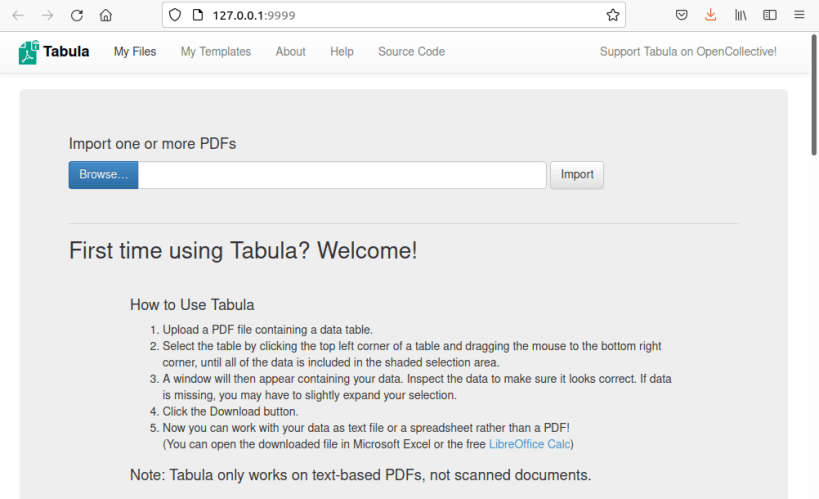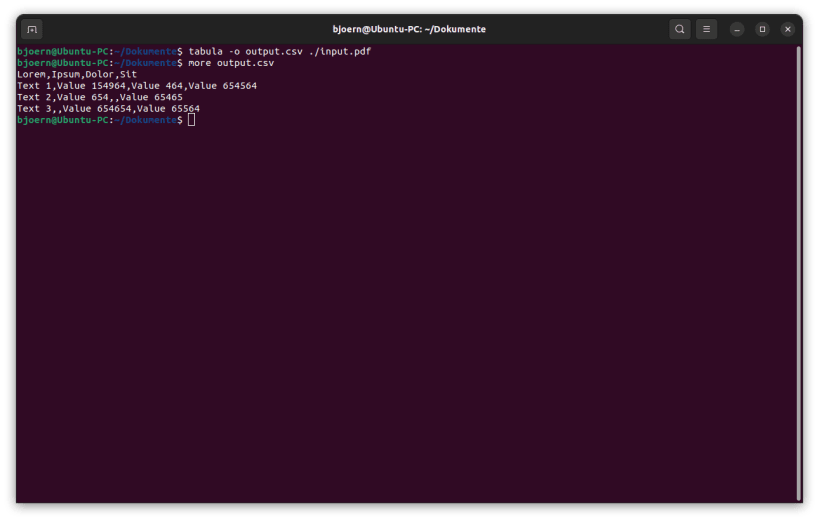




If you’ve ever tried to do anything with data provided to you in PDFs, you know how painful this is — you can’t easily copy-and-paste rows of data out of PDF files. Tabula allows you to extract that data in CSV format, through a simple web interface.
Caveat: Tabula only works on text-based PDFs, not scanned (purely image based) documents. If you can click-and-drag to select text in your table in a PDF viewer (even if the output is disorganized trash), then your PDF is text-based and Tabula should work.
Security Concerns?: Tabula is designed with security in mind. Your PDF and the extracted data never touch the net -- when you use Tabula on your local machine, as long as your browser's URL bar says "localhost" or "127.0.0.1", all processing takes place on your local machine. Even external version checks and the anonymous stats counter have been disabled in the snap.
If you start the program by clicking on it's icon this snap starts a local web server and then automatically opens a browser window. Close the terminal window to stop the server.
To learn how to use Tabula in the best way, I recommend Alastair Otter's tutorials on YouTube: https://youtu.be/IEusn9HB1sc
In addition to the Tabula server this snap brings you "Tabula-Java" - the command line version of Tabula. Type tabula --help in your terminal to learn about the available parameters.
It is a community snap without support by Tabula's authors.
You are about to open
Do you wish to proceed?
Thank you for your report. Information you provided will help us investigate further.
There was an error while sending your report. Please try again later.
Snaps are applications packaged with all their dependencies to run on all popular Linux distributions from a single build. They update automatically and roll back gracefully.
Snaps are discoverable and installable from the Snap Store, an app store with an audience of millions.

Snap can be installed from the command line on openSUSE Leap 15.x and Tumbleweed.
You need first add the snappy repository from the terminal. Choose the appropriate command depending on your installed openSUSE flavor.
Tumbleweed:
sudo zypper addrepo --refresh https://download.opensuse.org/repositories/system:/snappy/openSUSE_Tumbleweed snappy
Leap 15.x:
sudo zypper addrepo --refresh https://download.opensuse.org/repositories/system:/snappy/openSUSE_Leap_15.6 snappy
If needed, Swap out openSUSE_Leap_15. for, openSUSE_Leap_16.0 if you’re using a different version of openSUSE.
With the repository added, import its GPG key:
sudo zypper --gpg-auto-import-keys refresh
Finally, upgrade the package cache to include the new snappy repository:
sudo zypper dup --from snappy
Snap can now be installed with the following:
sudo zypper install snapd
You then need to either reboot, logout/login or source /etc/profile to have /snap/bin added to PATH.
Additionally, enable and start both the snapd and the snapd.apparmor services with the following commands:
sudo systemctl enable --now snapd
sudo systemctl enable --now snapd.apparmor
To install Tabula, simply use the following command:
sudo snap install tabula
Browse and find snaps from the convenience of your desktop using the snap store snap.

Interested to find out more about snaps? Want to publish your own application? Visit snapcraft.io now.